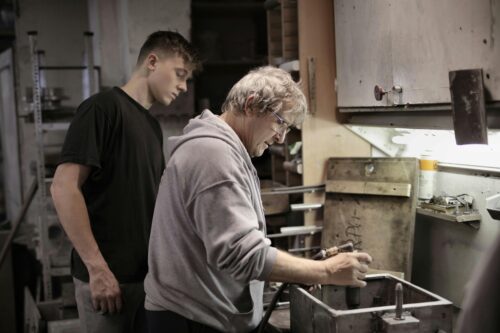If you’re a Deaf school leaver, finding out about apprenticeships can feel overwhelming. Here’s a brief guide to apprenticeships, what they are, how to find one, and how to apply.
There are four different levels of apprenticeship.
- Intermediate Apprenticeship (Level 2): Equivalent to GCSEs (grades A*-C/4-9), this level provides foundational skills and knowledge in a specific job role or industry.
- Advanced Apprenticeship (Level 3): Equivalent to A-levels, this level offers more advanced training and qualifications, enabling apprentices to develop higher-level skills relevant to their chosen career path.
- Higher Apprenticeship (Level 4-5): These apprenticeships lead to qualifications such as a foundation degree or higher national diploma (HND). They are designed for individuals who wish to continue their education to a higher level while gaining practical work experience.
- Degree Apprenticeship (Level 6-7): These apprenticeships allow individuals to earn a bachelor’s or master’s degree while working and gaining practical experience in their chosen field. They typically involve a combination of on-the-job training and academic study at a university.
Each level builds upon the previous one, offering apprentices the opportunity to progress in their careers while gaining recognized qualifications.
An apprentice usually spends 20% of their time at a college, working towards their qualification. This works out as one day a week. The rest of the time they will be at their work placement, getting on the job training and gaining experience. Apprenticeships are paid, however the wages will be lower than other workers. Wages vary depending on your age and your employer.
Your employer and training provider will offer support and guidance throughout your apprenticeship.
What do you want to do?
What do you enjoy doing? Do some research about the industry you want to work in and the skills you will need. What sort of job roles are available? Are their certain qualifications you need? What personal qualities do you have that would suit that role?
If there is a particular employer you’d like to work for, find out if they have an apprenticeship programme.
You can look up what apprenticeships are available in your area and apply via the governments website (https://www.findapprenticeship.service.gov.uk/apprenticeshipsearch ).
You might want to look into programs offered by universities and other training providers. You can find vacancies on company websites, job boards, and apprenticeship training websites.
You can also find out more information on The Apprenticeship Guide website. (https://apprenticeshipguide.co.uk/ )

How to apply.
Make sure you meet the criteria before you apply. This might include age requirements, qualifications or specific skills.
Update your CV to reflect the requirements of the job role.
Before your interview, research the company and practice interview questions. Thank about any skills or experiences that make you a suitable candidate.
There can be lots of competition for apprenticeship placements. Don’t be discouraged if you don’t get the first one you apply for. Look at each one as an opportunity to refine your interview skills and grow your network.
You can also apply directly to an employer if they have an apprenticeship programme.
You may need a covering letter CV detailing your skills, education and experience or there may be an application form.
There will be an interview which, alongside a conversation could include an aptitude test or assessment. You may also have a trial period.
You passed the interview, what’s next?
When you first start your apprenticeship you will probably have an orientation session where you will meet your work colleagues and line manager. You will get information about health and safety, company policies as well as your apprenticeship programme.
You may start with on the job training, shadowing colleagues to find out what they do, or more formal classroom based training sessons.
Everyone finds it a bit overwhelming starting a new role, don’t be afraid to ask questions and make notes on things you need to remember.
You will have a supervisor or mentor who will check in on you to see how things are going. You can also ask them any questions you have about the job or your progress.
Balancing work, study and your personal life can be challenging. Prioritise your tasks and plan ahead when assignments are due. Make time outside of work for self care.
Problems with apprenticeships
Sometimes there is limited availability in certain regions, this can make it harder to find a placement.
Apprentices are usually paid lower wages than other workers. This can make it harder to be financially independent.
The quality of the apprenticeship program depends on the training provider and employer. Do some research on both before committing.
Support for Deaf apprentices.
Access to work and disabled student allowance can provide assistance with anything you need to access work or college, such as interpreters, notetakers or equipment. Your employer may need to send those you are working with on deaf awareness training to ensure clear communication in your work placement.
Your employer and trainer are required by law to make reasonable adjustments to make sure that you are not disadvantaged or discriminated against because you are deaf.
What happens when I’ve finished my apprenticeship?
When your apprenticeship is finished, you may have the opportunity for permanent work or further study.
If you don’t want to go to university full time but need a qualification for your chosen career, apprenticeships are a great way to do this whilst gaining work experience and on the job training.
Want to find out more about what Deaf Unity do to support deaf school leavers and those entering the workforce? Find out more about What We Do.

